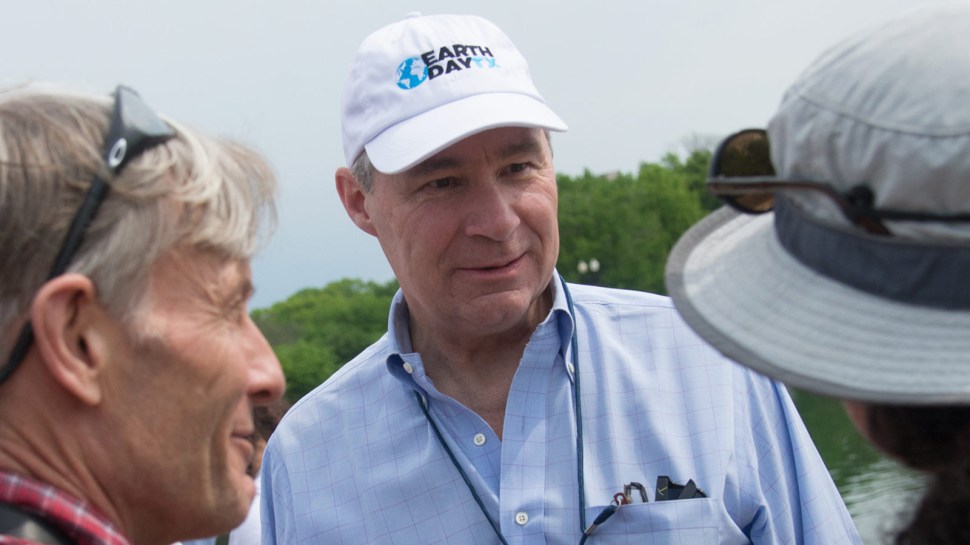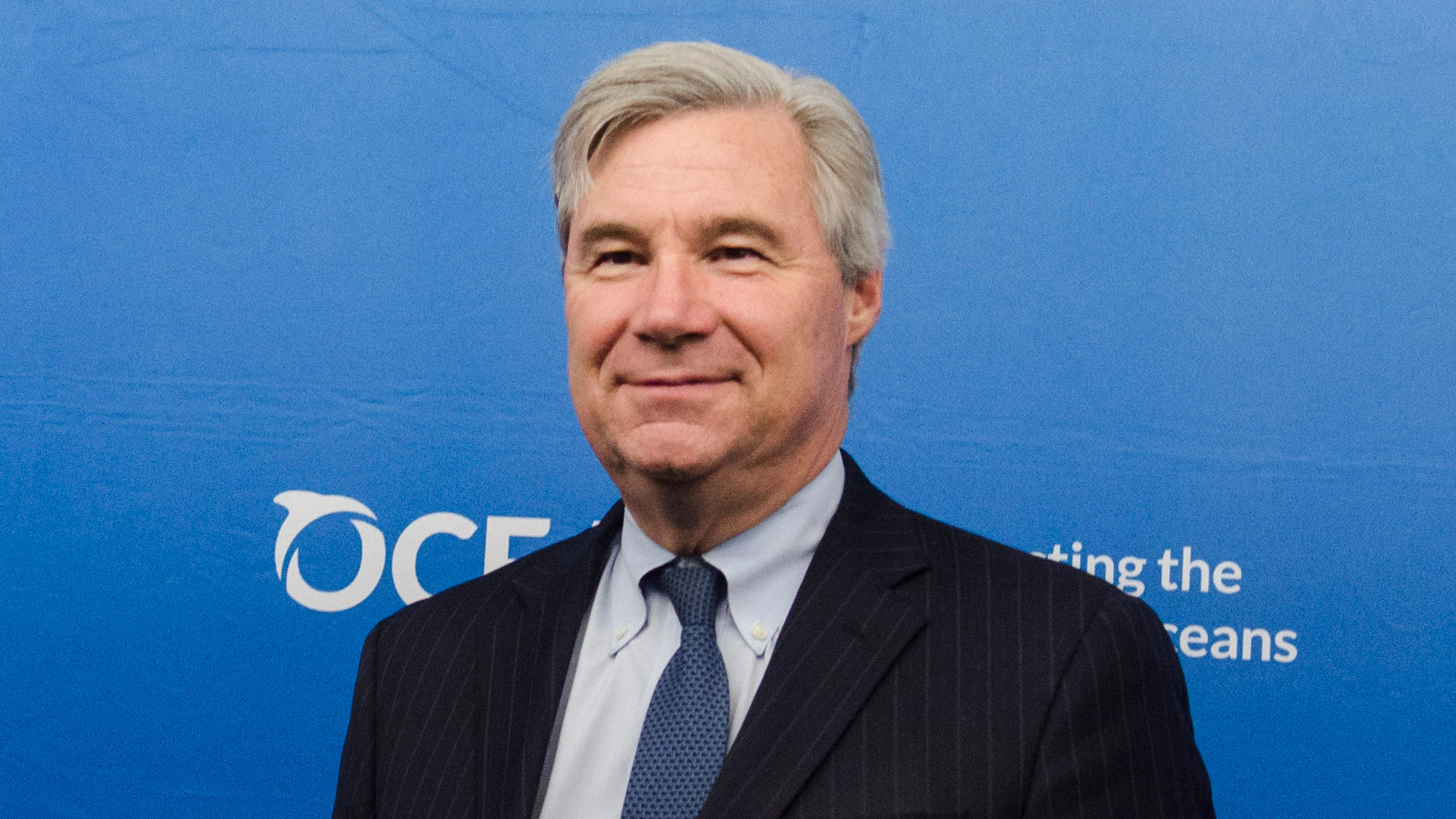Sheldon Whitehouse, a two-term senator from Rhode Island, is among the fiercest climate hawks nesting in the U.S. Congress. He just wishes his party would embrace action on climate change as more of a core concern.
“It really drives me crazy we are where we are on that,” he says. “There’s an entire generation of young voters eager to be motivated on this issue.”
Since he was elected to the Senate in 2008, Whitehouse says residents of Rhode Island fishing communities, who once rolled their eyes when he spoke of climate change, now report that their potential catch is moving around the Atlantic in unpredictable ways. The tricks of the trade passed down from generation to generation no longer work.
“They’re saying things to me like, ‘Sheldon, this is not my grandfather’s ocean. Sheldon, things are getting weird out there,’” Whitehouse says.
Despite partisan rancor in Washington, D.C., Whitehouse had a big win last summer, when he was part of a bipartisan trio of senators — along with Alaska Republican Dan Sullivan and New Jersey Democrat Cory Booker — that introduced an oceans-protection bill and then proceeded to muster unanimous support for its passage.
The bill, which is still in committee in the House, would reauthorize a marine debris program within the National Oceanic and Atmospheric Administration and create emergency funding for cleaning up plastics resulting from a weather emergency, like a flood or a hurricane. But it’s Whitehouse’s hope that the federal government’s efforts to get garbage out of the world’s oceans will go even farther.
“It needs to be an important part of America’s trade policy to pursue the half-dozen Asian countries whose, excuse my language, crap upland waste management infrastructure is at the heart of the ocean plastic debris problem,” Whitehouse says. “They shouldn’t be able to get away with that without our trade clout putting some pressure on that.”
Grist caught up last month with Whitehouse in Newport, Rhode Island, during a stopover of the ’round-the-world Volvo Ocean Race. (Volvo recently announced it would remove single-use plastics from all its offices and events across the globe by next year, replacing its annual usage of more than 20 million single-use plastic items with alternatives.) Whitehouse discussed how support coalesced around the ocean plastics bill, whether Democrats will ever truly run on climate, and of course, what to do about controversial EPA Administrator Scott Pruitt. This interview has been edited and condensed for clarity.
Q. The Senate bill to remove plastics and other debris from our seas — how did it end up being a unanimous vote at a time of such tension and animus?
A. When I got to the Senate, I set up an oceans caucus. We’re at about 38 members now. It is very bipartisan. It’s nearly half Republicans. So that gives us a forum to take an issue like ocean plastics and work it through a whole bunch of Republican offices. And if we can get the caucus signed off on a bill, then when it goes to the floor for consideration to be passed by unanimous consent, Republicans can look at this bill and say, “Oh, wow, 15 or 16 of my colleagues on the Republican side have signed off on this,” and their suspicions abate, and they’re willing to support it.
One of my stranger bedfellows on that bill was Jim Inhofe [R-Oklahoma]. On climate change, we are in fairly violent opposition. On this oceans topic, he became an initial co-sponsor of the bill, largely because of childhood experiences on the Gulf Coast and a particular affinity for protecting sea turtles. So when you’ve got a Sheldon Whitehouse and Jim Inhofe measure, that sends a pretty strong signal to the Senate that this is something we can get behind.
This is the first time the Senate has acted on marine plastic debris. This is the first time Congress has ever acted on marine plastic.
Q. How have you made changes around the use of plastics in your own life?
A. I tend to be more aware of it. I can’t say I’ve gone to perfect zero yet; sometimes there really isn’t an alternative.
The fact that we’re thinking about this, the fact that we’re concerned with where this plastic goes is a part of what will lead the companies and universities to design a truly biodegradable plastic that can be safe in the oceans, will lead companies to improve their supply chains, and will cause nations to put pressure on the really big plastic polluter, Asian countries.
When those big things happen, that’s how we really win this problem. But the big things don’t happen if you don’t have the change in the hearts and the minds of regular people. So if you’re reading this and you used a plastic coffee cover cup this morning, don’t feel bad. The important thing is that you noticed that that was taking place and that you’re aware of it.

Zach D. Roberts / NurPhoto via Getty Images
Q. How much appetite do you find among Democrats for climate change as a political issue? Is this becoming a core issue for the party?
A. Among Democrats, it’s pretty solid. I think we have virtually unanimous Democratic support for anything that we can move forward on. What’s more interesting is hearing from Republican colleagues. There are probably 10 or 12 Republican senators who I think would gladly work on a piece of climate legislation if they felt that they had any support from America’s corporate community. And so far there hasn’t been much interest shown by America’s corporate community in supporting Republicans that might want a break with the party. So that has been a problem.
This is not a partisan problem. This is a political problem of a very big special interest that is putting intense political pressure on one party. But as soon as that political pressure eases, there will be plenty of Republicans to work with.
Q. We at Grist noticed when the Democrat leadership last year announced its A Better Deal plan — a Democratic response to what was going on in Congress and with the administration — climate change didn’t really show up, except as a portion of infrastructure spending. Doesn’t that imply climate is not really a central issue for the party? [Editor’s note: Since this interview, the Democratic National Committee has announced it would no longer accept contributions from fossil fuel-related PACs.]
A. It’s one of the reasons I do what I do — trying to raise the profile of this issue in our party. I think it’s a big and winning issue if we take it on.
We had huge opportunities during the Obama administration that we walked away from. There’s a terrific winning story to be told about big special interests controlling Congress and harming the environment. Instead, we’ve let ourselves get trapped into the jobs-versus-polar-bears false dichotomy.
Q. Given your frustration in the past with the Obama administration’s pace at tackling climate change, what’s the chance of any real progress being made with Trump now in office?
A. I think there’s a realistic chance that something significant can happen fairly soon. Obviously, Trump is not going to be one of the forces driving that — it will be in spite of, and not because of, this administration. You’re seeing more and more Republican congressional districts in which it is no longer feasible to be a climate denier. In fact, to be a successful Republican politician, you’ve got to at least look like you’re serious about climate stuff, particularly in coastal districts. So I am hearing that there is going to be a bipartisan carbon price coming out of the House Climate Solutions Caucus before too long that’s being kind of negotiated.
Q. Surely that would encounter fierce resistance from the fossil-fuel industry, right?
A. For some time, there has been considerable talk about the big four oil companies (ExxonMobil, BP, Chevron, and Shell) agreeing to support a really robust price on carbon. So far, they are running a sham in which they say they understand that climate change is real, they know their product causes it, and they want a carbon price. But over in my world, in Congress, they are 100 percent dedicated to making sure that nothing happens.
Q. And you’re hearing their political position might shift to be more in line with their public stance?
A. If that shifts, that’s a big, big, big change. A lot of it is frankly being moved by the litigation that’s taking place: the kids in Oregon; the lawsuits out of Louisiana, California, and Colorado; the attorneys general in Massachusetts and New York. It’s one thing to be the bully in Congress where you’ve got the power and the influence; it’s another thing to try to pull that off in a courtroom. It’s not so easy in a courtroom.
Q. In your mind, what would a really substantial piece of legislation that put a proper price on carbon look like?
A. The one that I have puts a little bit over a $50-per-ton-of-emissions price on carbon. That’s probably the right range. I’ve been told that I can say that what the oil companies are considering is a $40-per-ton price on carbon. So if you’re at $40 versus $50, now we’re in negotiating range.
Some of the political constraints on it are: First, that we make sure that it’s not used to grow the size of government — that it would be so-called “revenue-neutral.” I don’t see a problem with that. And second, that it be border-adjustable, so you can make the requisite trade tariffs or trade-offs — so that, you know, the American cement block plant doesn’t lose all of its business to the Mexican cement block plant across the border, just because we have a legitimate carbon price and they don’t. You can adjust for that; it’s not that hard.
Q. When do you anticipate we might have a national price on carbon?
A. It would not surprise me at all that we were able to get a bill through the next Congress.
Q. I have to ask: How do you think congressional leaders are doing with holding Scott Pruitt accountable in upholding his agency’s mandate?
A. The guy is an absolute disaster, and he has no business serving as the EPA administrator. But there’s not a whole lot the Democratic Party can do about it, because we don’t have any gavels anywhere, we can’t issue subpoenas, we can’t require him to appear in hearings, and Trump loves all this polluter stuff. So it’s not a great environment for us.
Notwithstanding that, we’ve built an absolute bonfire under this guy. There are at least a dozen federal investigations into his conduct. It has been the relentless effort of Democrats in the minority, mostly in the Senate — led by our ranking member on the Environment and Public Works Committee, Senator Tom Carper [D-Delaware], with a number of us very, very involved — that has stoked that fire. And the pressure, I think, is mounting on Republicans to disavow this guy now, because his behavior is absolutely disgraceful.
If Gina McCarthy, the last Democratic administrator of the EPA, had done a quarter of what Pruitt has done, the Republicans would have their hair on fire to be rid of her. So the fact that this guy can be so vile and so awful and so crooked and so corrupt and so self-dealing, and they’re still trying to provide some cover for him is a sign of the power of the fossil-fuel industry. But the fact that they’re squirming is a good sign, and I would say there’s at least a 50-50 shot that he’s gone by Election Day.
Q. Would you sleep better at night if Andrew Wheeler, the current deputy administrator of the EPA and a former coal-industry lobbyist, replaced Pruitt?
A. There’s a quality to Andrew Wheeler of transactional integrity that I have experienced firsthand working with him, when he was staff on the Environment and Public Works Committee. And I think he might even have the brains and the foresight to understand that the fossil-fuel industry is speeding at a wall. You can’t make climate change go away by not using the term. There is going to be an accountability moment, and the fossil-fuel industry can either have a soft landing or a crash landing. Andrew Wheeler is nobody I would want anywhere near the Environmental Protection Agency, but he might be more sensible and a little bit less bizzare than Scott Pruitt.
Q. Let’s end on a positive note: What are some signs of hope that you see from your perch in the Senate?
A. The price trajectory of renewables is pretty amazing. It’s causing folks like the Colorado Public Utilities Commission to shut down currently operating coal plants because they’re more expensive to run. So when you’re at a tipping point like that, where new-built renewables will end up costing less than already-built coal plants, that’s a huge sign. I think that’s probably the biggest and the best change that is coming our way.
I would never want to underestimate the importance of the courts. In our system of government, the courts are the neutral place where you’re supposed to tell the truth, and both parties are supposed to be treated fairly. So to the extent that we’ve moved a lot of this debate about climate change out of Congress, which is so controlled by the fossil-fuel industry, and into courts, that’s actually been exactly as the Founding Fathers would want it to be. And the pressure of these lawsuits is what fills me with optimism.



